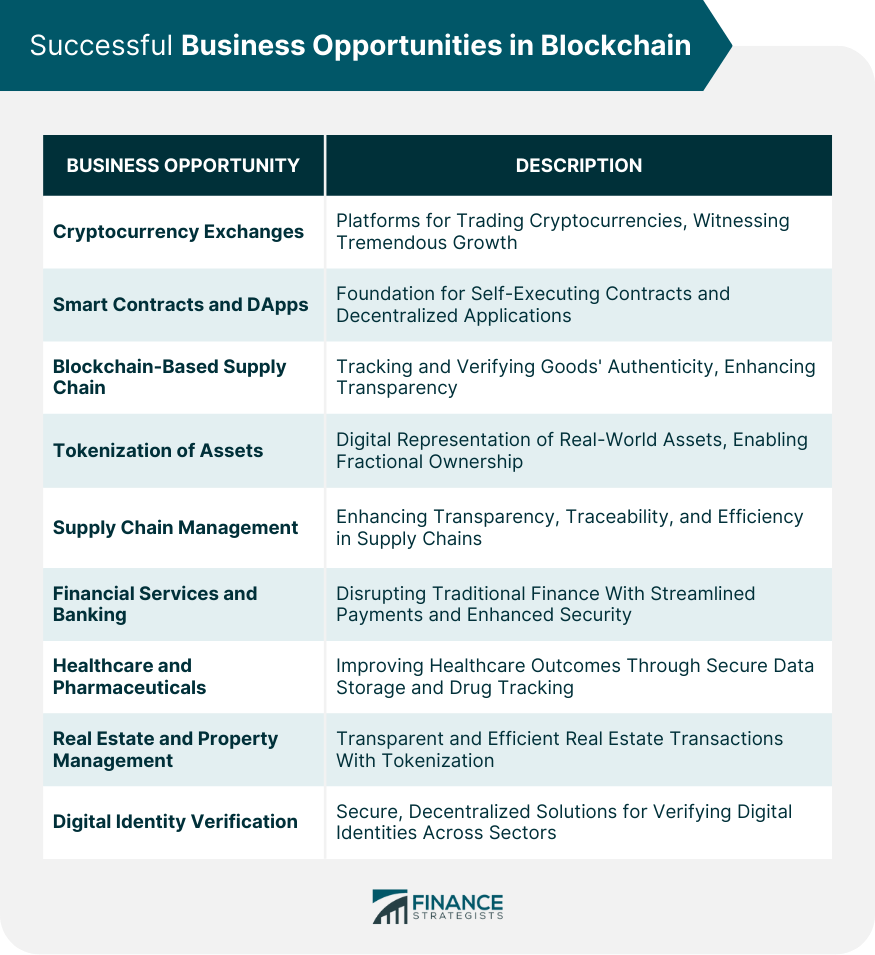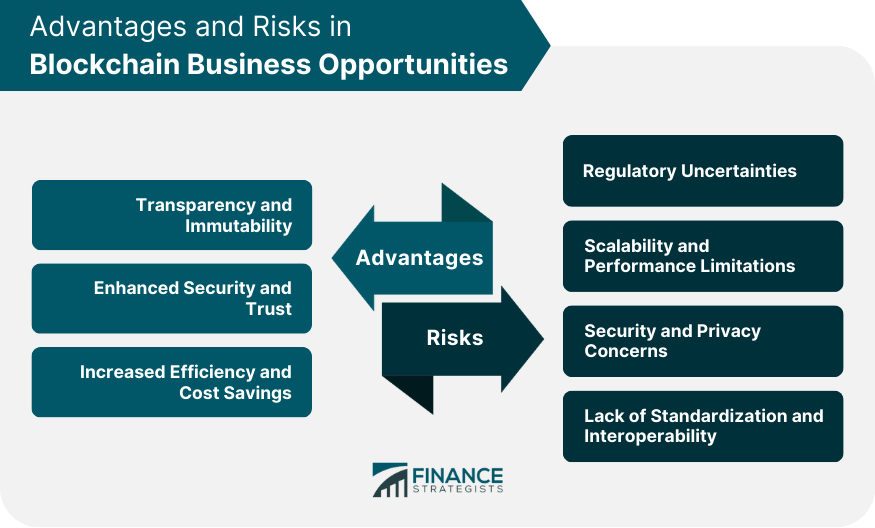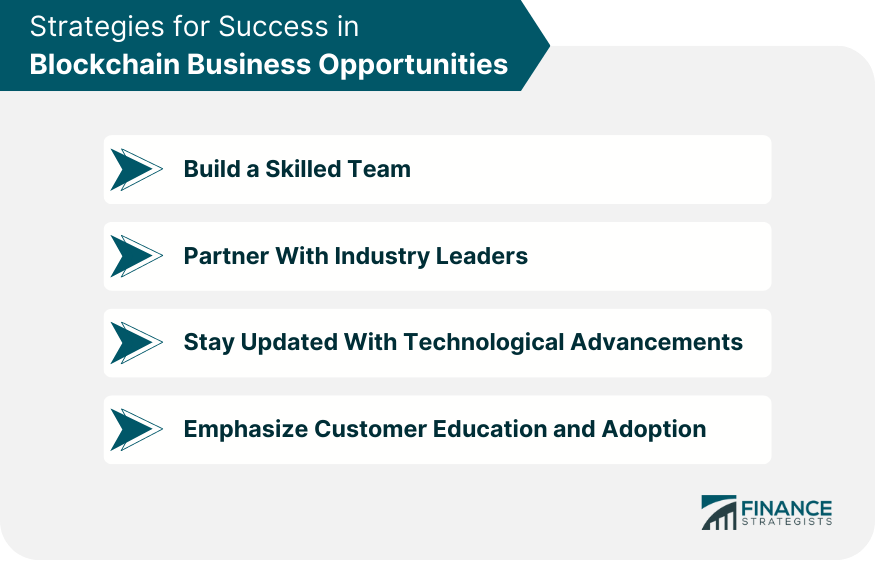Blockchain technology is a type of distributed ledger that maintains transaction records across multiple computers or nodes. It enables a peer-to-peer network where every participant can interact, transact, and share information transparently, with no need for a central authority. Blockchain operates on the principles of decentralization, transparency, and immutability. Once data is recorded on a blockchain, it cannot be altered or deleted, providing a trustless environment where every transaction is traceable and transparent to all network participants. Cryptocurrency exchanges are one of the most common and successful business applications of blockchain technology. These platforms provide a marketplace for trading cryptocurrencies like Bitcoin, Ethereum, and many others. With the increasing popularity and acceptance of cryptocurrencies, these exchanges have witnessed tremendous growth, with leading platforms like Binance, Coinbase, and Kraken earning billions in revenue. Cryptocurrency exchanges offer an attractive business opportunity due to the continuous influx of new cryptocurrencies and growing interest from institutional and retail investors. Blockchain technology provides a foundation for the development of smart contracts and decentralized applications (DApps). Smart contracts are self-executing contracts encoded on a blockchain. They automatically execute transactions when predefined conditions are met, eliminating the need for intermediaries. Ethereum is the most popular platform for developing smart contracts, paving the way for DApps that provide various services, including decentralized finance (DeFi), gaming, and content creation. This arena presents immense opportunities for developers and entrepreneurs to create innovative solutions. Blockchain's potential extends beyond finance into sectors like supply chain management. Blockchain can track and verify the authenticity and origin of goods, enhancing transparency and reducing inefficiencies and fraud. Companies like VeChain and IBM have already developed blockchain solutions for supply chain management, transforming how businesses operate. Tokenization involves the digital representation of real-world assets on a blockchain. It can include various assets, from real estate and artwork to intellectual property and financial instruments. Tokenization enables fractional ownership, improved liquidity, and transparent transactions, creating new opportunities for businesses and investors. Platforms like Polymath and Harbor are pioneering this space, indicating a prosperous avenue for blockchain businesses. Applying blockchain technology in supply chain management enhances transparency, traceability, and efficiency. It allows for the secure sharing of operational data and documentation across all parties involved, reducing fraud, improving inventory management, and speeding up processes. Companies like IBM, Maersk, and De Beers have successfully implemented blockchain in their supply chain management processes. Blockchain is set to revolutionize the banking and financial services sector. It can streamline payments, enhance security, provide transparency, and facilitate regulatory compliance. Cryptocurrencies, smart contracts, and decentralized finance (DeFi) platforms are just some of the blockchain-based innovations that are disrupting traditional financial institutions. Ripple, a blockchain-based payment protocol, is a prime example of how blockchain can improve cross-border transactions. Blockchain can bring about significant improvements in the healthcare and pharmaceutical sectors. It can help in securely storing and sharing patient data, tracking and authenticating drugs, improving clinical trials, and facilitating healthcare research. Companies like MedRec and Patientory are harnessing blockchain's capabilities to improve healthcare outcomes. In the real estate sector, blockchain can make transactions more transparent, efficient, and cost-effective. It can also enable tokenization, leading to fractional ownership of property and improved liquidity. Companies like Propy are making strides in implementing blockchain for real estate transactions. Blockchain can provide secure, decentralized solutions for digital identity verification. It can give individuals control over their personal data while ensuring their privacy and security. Blockchain-based identity verification has applications in numerous sectors, including financial services, healthcare, government services, and e-commerce. Blockchain's inherent characteristics of transparency and immutability make it a potent tool for businesses. Blockchain transactions are transparent to all network participants and once recorded, cannot be altered. This improves business integrity and trust among stakeholders while reducing the risk of fraud. Blockchain's distributed nature and cryptographic security make it highly resilient against cyber attacks. It provides a more secure environment for storing and sharing data than traditional systems, increasing trust among businesses and their customers. Blockchain can automate and streamline business processes, leading to increased efficiency and cost savings. By eliminating intermediaries, reducing paperwork, and automating processes through smart contracts, businesses can significantly reduce operational costs. The regulatory landscape for blockchain and related technologies is evolving and inconsistent across jurisdictions. These uncertainties can pose risks for businesses venturing into the blockchain space, making it crucial for them to stay informed about regulatory developments and adapt accordingly. Current blockchain platforms like Bitcoin and Ethereum face scalability and performance limitations. These challenges can affect transaction speed and throughput, potentially limiting the usability of blockchain applications in high-frequency environments. Despite blockchain's inherent security, vulnerabilities can arise from improper implementation or malicious actors. Moreover, while blockchain transactions are pseudonymous, concerns remain about privacy, particularly in public blockchains where transaction data is visible to all network participants. The lack of standardization in blockchain technologies and the difficulty of achieving interoperability among different blockchain platforms are significant challenges. These issues can limit the widespread adoption and integration of blockchain technology into existing business infrastructures. Success in blockchain ventures requires a skilled and knowledgeable team that understands blockchain technology and its potential applications in business. This includes not just technical experts but also professionals with expertise in business strategy, legal and regulatory matters, and customer experience. Partnering with industry leaders can provide valuable resources, guidance, and credibility for blockchain startups. Partnerships can offer opportunities for collaboration, learning, and growth, helping businesses to navigate the complex and rapidly changing blockchain landscape. The blockchain field is evolving rapidly, with continuous advancements in technology, applications, and regulatory landscapes. Staying abreast of these developments can help businesses to adapt, innovate, and maintain a competitive edge in the market. Educating customers about blockchain and promoting its adoption is essential for business success. This includes demonstrating the value and benefits of blockchain-based solutions, addressing misconceptions and fears, and facilitating easy and user-friendly interactions with the technology. Blockchain technology presents a multitude of business opportunities, spanning diverse sectors, from finance and supply chain management to healthcare and real estate. The advantages of blockchain technology in business include transparency and immutability, enhanced security and trust, and increased efficiency and cost savings. These advantages promote integrity, improve trust among stakeholders, and streamline business processes. However, there are also risks to consider, such as regulatory uncertainties, scalability and performance limitations, security and privacy concerns, and the lack of standardization and interoperability. To succeed in blockchain business opportunities, it is crucial to build a skilled team, partner with industry leaders, stay updated with technological advancements, and emphasize customer education and adoption. As blockchain technology continues to evolve, it promises to unlock even more opportunities and transformations in the business world. Overview of Blockchain Technology
Successful Business Opportunities in Blockchain
Cryptocurrency Exchanges
Smart Contracts and Decentralized Applications (DApps)
Blockchain-Based Supply Chain Platforms
Tokenization of Assets
Supply Chain Management
Financial Services and Banking
Healthcare and Pharmaceuticals
Real Estate and Property Management
Digital Identity Verification

Advantages of Blockchain Technology in Business
Transparency and Immutability
Enhanced Security and Trust
Increased Efficiency and Cost Savings
Risks in Blockchain Business Opportunities
Regulatory Uncertainties
Scalability and Performance Limitations
Security and Privacy Concerns
Lack of Standardization and Interoperability

Strategies for Success in Blockchain Business Opportunities
Building a Skilled Team
Partnering With Industry Leaders
Staying Updated With Technological Advancements
Emphasizing Customer Education and Adoption

Conclusion
Business Opportunities in Blockchain FAQs
Blockchain technology is a decentralized, distributed ledger that records transactions across multiple computers or nodes. It provides a secure and transparent environment for data storage and transactions.
Blockchain technology has found successful applications in areas like cryptocurrency exchanges, smart contracts, supply chain management, tokenization of assets, and digital identity verification.
Blockchain technology can bring transparency, enhance security, and increase efficiency in business operations. It can also reduce operational costs by eliminating intermediaries and streamlining processes.
The risks include regulatory uncertainties, scalability and performance limitations, security and privacy concerns, and the lack of standardization and interoperability among different blockchain platforms.
Strategies for success include building a skilled team, partnering with industry leaders, staying updated with technological advancements, and emphasizing customer education and adoption.
True Tamplin is a published author, public speaker, CEO of UpDigital, and founder of Finance Strategists.
True is a Certified Educator in Personal Finance (CEPF®), author of The Handy Financial Ratios Guide, a member of the Society for Advancing Business Editing and Writing, contributes to his financial education site, Finance Strategists, and has spoken to various financial communities such as the CFA Institute, as well as university students like his Alma mater, Biola University, where he received a bachelor of science in business and data analytics.
To learn more about True, visit his personal website or view his author profiles on Amazon, Nasdaq and Forbes.











